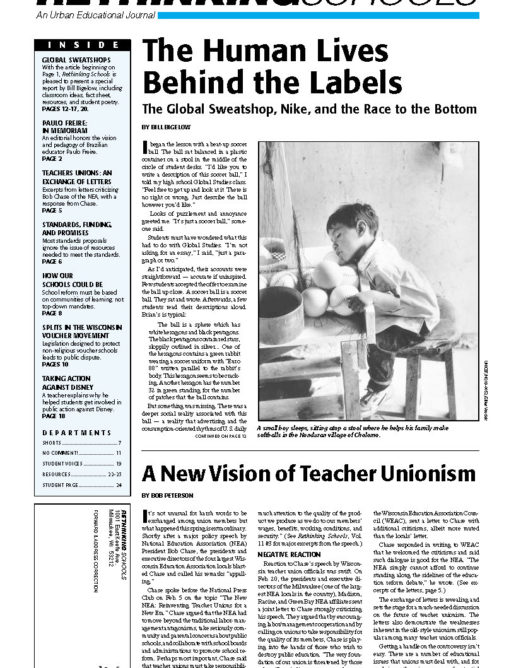Teacher Unionism
Here are the two letters written to NEA President Bob Chase by Wisconsin teacher union leaders.
February 20, 1997
Dear Bob:
We write to you on behalf of the 25,000 members represented by our unions to express how angry we are with your Feb. 5 address to the National Press Club.
For one who was elected to advocate for members, your remarks are not only appalling, they ignore the fundamental strength of a union. The very foundation of our union is threatened by those who will capitalize on your remarks as an expression of weakness.
What is most profoundly disturbing is your acknowledgment that “traditional industrial style teacher unions have brought major improvements to public education,” then to proceed to debauch these accomplishments with the insight “that it’s time to create a new union,” to “reinvent it.” We are union and we are proud; we stand in solidarity to defend against those who are attempting to destroy us. There is no reason to accommodate the privateers, those who would destroy the essence of bilateral determinism achieved through collective bargaining. It is, at best, naive to believe that the people who are attempting to destroy our union for ideological and economic gain will be assuaged because of your pledge to get “the bad teachers out of the classroom.”
Because you were a social studies teacher before you became President of NEA, you should understand the results of appeasement in Eastern Europe in the 30’s and 40’s.
Members pay dues for us to promote their interests. In our work with our members who have been judged by management as being deficient, we have, with the assistance of other union members, helped those in need become successful teachers and when necessary, counseled them to seek alternative employment. Why should we accept the responsibility for poor quality teaching in light of inadequate teacher preparation programs at schools of education or the inept or politically expedient hiring decisions of administration and school boards?
You must understand our reality. We have a governor and a legislature committed to wiping out the rights of our members, curtailing collective bargaining rights, attempting to shift precious resources from our schools to private and religious schools. They are the true impediments to reform of public education. In the 80’s Frank Lorenzo tried the same tactics in commercial aviation. He was publicly excoriated and banned from the business.
We contrast your comments with the reinvigoration of the AFL-CIO leadership accepting the challenge to return to its roots, to organize and to challenge employers all over the United States. It’s time that NEA joins the labor movement, renews its commitment to its members, and moves forward in its quest on behalf of education employees across the nation.
In Solidarity,
Miles Remsing, President; Richard Feldhausen, Executive Director, Green Bay Education Association
Sara Bringman, President; John Matthews, Executive Director, Madison Teachers Inc.
Chuck Howard, President; Sam Carmen, Executive Director, Milwaukee Teachers Education Assoc.
Dennis Wiser, President; James Ennis, Executive Director, Racine Education Association
March 5, 1997
Dear Bob:
At the February meeting of the Wisconsin Education Association Council Board of Directors, the topic of your February 5, 1997, address to the National Press Club was raised. … Let me state at the outset that while there were Board members on both sides of the issue … a clear majority, including myself, found your remarks cause for concern. …
Those who favored the new direction thought that your comments clearly articulated what they believed — that is, that a time had come for just such a change and that we need to be driven by what the public thinks about public education.
Conversely, those opposed (a majority) found your remarks troubling. Wisconsin, like many other states, has a rich tradition of collective bargaining, member advocacy, and unionism. The view of a majority of the WEAC Board members is that a balance must be struck between “member advocacy” issues and the “professionalism” issues. … Many in Wisconsin view your “new direction” as moving that balance dramatically in the direction of “professionalism” at the expense of “member advocacy and unionism.” Further, we feel that this issue is not an either/or debate. … You have already received a letter from four of our urban affiliates, which represents their position, and in large part, mirrors some of the attitudes expressed by the WEAC Board. …
Sincerely,

